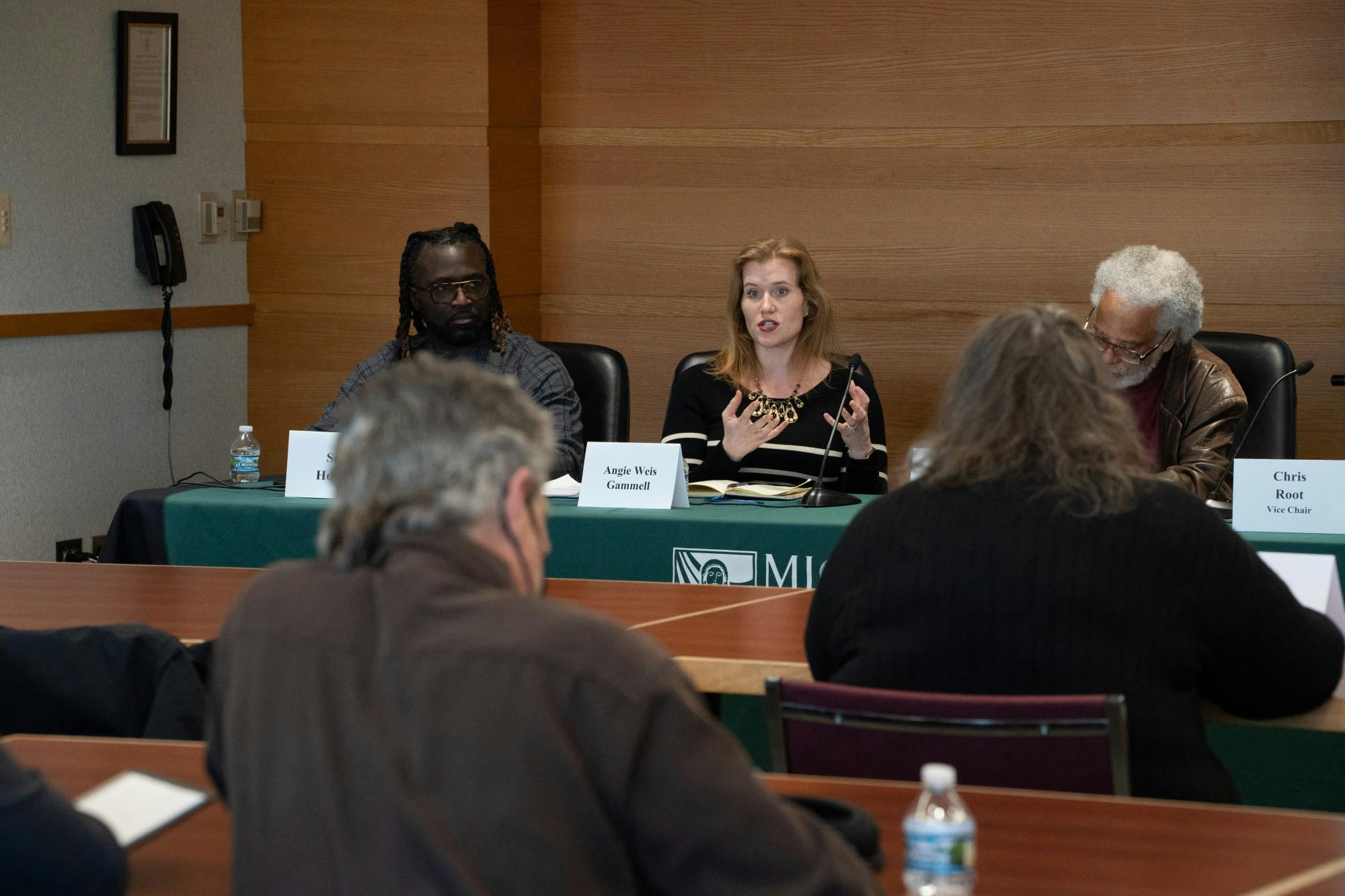A panel of researchers and community leaders spoke before the East Lansing Independent Police Oversight Commission about use of force by police officers Wednesday night, urging modifications to the way officers approach interactions with community members.
The event, held at the MSU Law College, was part of an ongoing initiative by the commission to re-examine the policing methods of the East Lansing Police Department, or ELPD, after officers shot DeAnthony VanAtten in April 2022.
Included in the panel was Professor Angie Weis Gammell, policy director at the Wilson Center for Science and Justice at Duke University, who said that examining ELPD records showed a significant number of use of force incidents occurred with a person experiencing a mental or behavioral health crisis.
“There's a real opportunity for improvement by rethinking some of the current practices on calls where there's a response to someone who might be in crisis or someone who might be part of a vulnerable population,” Weis Gammell said.
Weis Gammell compared East Lansing’s standards for use of force by police to those set at the state and national levels. She said departments across the country, including ELPD, could benefit from redefining what level of force is expected of police officers.
While the standard set by the U.S. Supreme Court allows officers to use “reasonable” force, the next step to eliminating unnecessary escalation and violence would be advising officers to use the least possible or “minimal” force, Weis Gammell said.
“Force should not be used simply to resolve the situation more quickly, unless an extended delay would risk human safety or significantly interfere with law enforcement objectives," Weis Gammell said.
Black Lives Matter Lansing and One Love Global co-leader and panel member Pastor Sean Holland echoed the statements of researchers but said that fundamental aspects of law enforcement need to change to protect civilians, especially Black people who are targeted at higher rates in use of force incidents.
“The truth is that policing in America started as slave patrols,” Holland said. “Over 400 years black people have been hunted, beaten, brutalized and murdered at the hands of the state. Black people have never had the opportunity to roam free without surveillance and monitoring.”
Holland pointed to several practical solutions to the overuse of force in policing including ending qualified immunity and changing the legal language that gives officers the right to kill. He said that protections for police officers in the legal system make it easier for officers to commit acts of violence against civilians.
“DeAnthony VanAtten was shot as East Lansing police officers violated their own police policies and city ordinance,” Holland said.
The panel also featured University of Michigan faculty member Trevor Bechtel, who leads projects on prosecutor transparency and poverty solutions. Bechtel presented a report on best practices for reducing excessive use of force that he and his students conducted in 2020 after the murder of George Floyd at the hands of police.
Bechtel laid out four key factors that his research showed to reduce use of force incidents: increased tracking of data regarding use of force, increased number of diverse police officers, stricter firearm policies and the use of body cameras that officers are unable to turn off themselves.
“The culture of our communities and of our law-and-order agencies are important factors shaping the interface between enforcement and the public,” Bechtel said. “Cultural influences determine how police officers perform their jobs, how policies and reforms are implemented, and therefore how they affect individuals who come into contact with police officers.”
Black Lives Matter Lansing member Karrington Kelsey said that while he was appreciative of the panelists’ research and thoughts, he’s waiting to see tangible changes in policy.
“We’re way past the point where we need to prove why we need systemic change,” Kelsey said.
Oversight Commission vice Chair Chris Root said that apart from ELPD Chief Chad Pride, there were no officers from the department documented in attendance. Kelsey said he hopes in the future to see not only police officers, but other government officials present in meetings about police reform.
“Legislators need to be here,” Kelsey said. “The people who are part of the police unions, that send out the money, that are trying to save the system as it is now — they need to be in this room. And not only that, but the community needs to be here.”
Holland said he “felt like crying” thinking about how it took so long for many Americans to realize the seriousness of police brutality against Black people. He hopes unnecessary use of force can be removed from policing to “protect the sanctity of life” for people of all races.
“This is a call to the chief, to the police department to put a moratorium on killing Black people,” Holland said.







